
Ganadora del Premio Oscar al Mejor Largometraje Documental
Imagine that one day a demolition team arrives in your neighborhood, accompanied by the army, with the order to demolish your house, the same house where you were born and grew up, where your children were born and where you've lived all your life. Now imagine that the order is given by a government that is not yours, that doesn't represent you, and that the excuse is that your house is in a territory that will be used to build a military compound for that army that for decades has had control of your streets and your life, but again, it's not your army, it's the armed forces of a country that settled in your territory because the international community allowed it and did nothing about it. It sounds like a horror movie, but that's more or less the reality told in this documentary.
Imagina que un día llega a tu barrio un equipo de demolición, acompañado del ejército, con la orden de derribar tu casa, la misma casa en la que naciste y creciste, donde nacieron tus hijos y donde has vivido toda tu vida. Ahora imagina que la orden viene dada por un gobierno que no es el tuyo, que no te representa, y que la excusa es que tu casa está en un territorio que será utilizado para construir un recinto militar para ese ejército que durante décadas ha tenido el control de tus calles y de tu vida, pero - nuevamente - no es tu ejército, se trata de las fuerzas armadas de un país que se instaló en tu territorio porque la comunidad internacional se lo permitió y no hizo nada. Suena como una película de terror, pero esa es más o menos, la realidad que se cuenta en este documental.
It's very difficult to satisfactorily explain the Israeli-Palestinian conflict not only because of its duration and scope, but also because of the way information has been handled for decades. Many things have been said from one side or the other and it's very difficult to take sides or stick to one of those versions, so the task of being objective is challenging, but not impossible. We need only refer to the facts. In 1947 a UN assembly decided to give most of the territory of Palestine (56%) to the Jewish people to establish a nation that until then they didn't have. The Jews were the great victims of the Second World War and the holocaust suffered at the hands of the Third Reich, their situation was lamentable and the horrors of Nazism internationally condemned, but to create a country? to take a territory that was already occupied and hand it over to someone else as if it were a toy taken from one child to give to another? This was the origin of the Israeli-Palestinian conflict, which has had its high points and some periods of false peace, but the central problem is that there's a tremendous inequality between the two sides. The Palestinian people is a people accustomed to rural life, traditionalist, who don't have a recognized government (they are observers in the UN, but not members and many countries don't recognize them) nor the wealth to establish one, while Israel is a state with important allies, such as the US and the UK, which has one of the most powerful armies known, with advanced technology, elite forces and cutting-edge weaponry. And both occupy the same territory, who do you think wields the power there?
Es muy difícil explicar satisfactoriamente el conflicto entre Israel y Palestina no sólo por su duración y alcance, sino también por la forma en que se ha manejado la información durante décadas. Muchas cosas se han dicho de un lado y otro y es muy difícil tomar partido o quedarse con una de esas versiones, por lo que la labor de ser objetivos es desafiante, pero no imposible. Sólo hay que remitirse a los hechos. En 1947 una asamblea de la ONU decidió entregar la mayor parte del territorio de Palestina (el 56%) al pueblo judío para establecer una nación que hasta entonces no tenían. Los judíos fueron las grandes víctimas de la segunda guerra mundial y el holocausto sufrido a manos del Tercer Reich, su situación fue lamentable y los horrores del nazismo condenados internacionalmente, pero ¿crear un país? ¿tomar un territorio que ya estaba ocupado y entregarlo a alguien más como si se tratase de un juguete que se le quita a un niño para dárselo a otro? Este fue el origen del conflicto entre Israel y Palestina que ha tenido momentos más álgidos y algunos períodos de falsa paz, pero el problema central es que existe una desigualdad tremenda entre ambos lados. El pueblo palestino es un pueblo acostumbrado a la vida rural, tradicionalista, que no cuenta con un gobierno reconocido (son observadores en la ONU, pero no miembros y muchos países no los reconocen) ni con riquezas para establecerlo, mientras Israel es un Estado con aliados importantes, como EEUU y el Reino Unido, que tiene uno de los ejércitos más poderosos que se conocen, con tecnología avanzada, fuerzas de élite y armamento de vanguardia. Y ambos ocupan el mismo territorio, ¿quiénes creen ustedes que ejercen allí el poder?
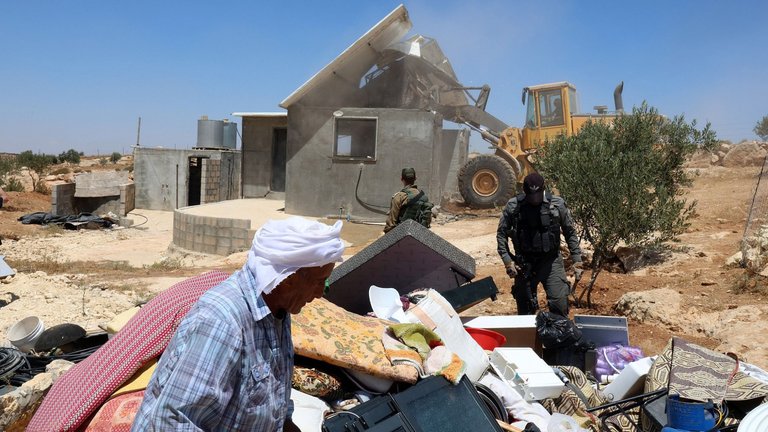
Supported by the cultural and economic interests of countries like the United States, Israel has taken it upon itself to dictate the law in a territory that, according to the initial agreement, was to be shared. It makes sense that the Palestinian people feel it as an invasion: the Jews arrived, settled, created a country, an army, and established a law—at their convenience, of course—that they oblige the Palestinians to abide by. All this amidst the indifference of the international community. And this isn't something that happened five or ten years ago; we've been going on for almost eighty years in a situation in which what is depicted in No Other Land is only a tiny part, a vertex, an edge of an immense geometric figure.
Apoyados por los intereses culturales y económicos de países como los EEUU, Israel se ha hecho cargo de dictar la ley en un territorio que según el acuerdo inicial debía compartirse. Tiene sentido que el pueblo Palestino lo sienta como una invasión: los judíos llegaron, se establecieron, crearon un país, un ejército y establecieron una ley - a su conveniencia, por supuesto - que obligan a los palestinos a cumplir. Todo ante la indiferencia de la comunidad internacional. Y esto no es algo de cinco o diez años, ya vamos para casi ochenta años de una situación en la que lo mostrado en No Other Land es sólo una mínima parte, un vértice, una arista de una figura geométrica inabarcable.
Masafer Yatta, in the West Bank, is a territory of rural villages where Palestinians have lived for generations. Basel Adra, a young Palestinian activist who since childhood has watched his own people fight against the mass expulsion of their community, begins filming the Israeli authorities' procedures. Camera in hand, sometimes with his cell phone, he films soldiers - sometimes accompanied by armed, non-uniformed and hooded men - tearing down houses, beating unarmed villagers and even shooting them with firearms, causing serious and irreversible injuries and even death. There has been much talk in the West about Palestine as a state of terrorists because of attacks over time. True, that has happened. But there's a radical arm on each side of this cause. However, in Masafer Yatta we don't see a war between two radicalisms, but an armed, powerful, aggressive side attacking farmers, including children, and destroying their homes, corrals and schools. The justifications would be laughable if they were not so frustrating. The Palestinians cannot build in that territory because it has been declared a military zone (for the Israeli army, of course), but by then the farmers had been living there for generations; the other reason is that the Palestinians don't have legal permits to build in the sector and guess who issues those permits: the Israeli government. So how to wage such an unequal struggle? Basel decides to do it camera in hand and denouncing through social networks until he catches the attention of the international media on the issue. At one point, Basel meets Yuval, an Israeli journalist who from then on accompanies him in his efforts.
Masafer Yatta, en Cisjordania, es un territorio de villas rurales en donde los palestinos han vivido durante generaciones. Basel Adra, joven activista palestino que desde su infancia ha visto cómo los suyos han luchado contra la expulsión masiva de su comunidad, comienza entonces a filmar los procedimientos de las autoridades israelíes. Cámara en mano, a veces con el celular, filma a soldados - a veces acompañados de hombres armados, no uniformados y encapuchados - que derriban casas, golpean a los pobladores desarmados e incluso les disparan con armas de fuego, causándoles graves e irreversibles lesiones y hasta la muerte. En Occidente se ha hablado mucho de Palestina como un estado de terroristas debido a ataques sufridos a lo largo del tiempo. Es cierto, eso ha sucedido. Pero hay un brazo radical en cada lado de esta causa. Sin embargo, en Masafer Yatta no se ve una guerra entre dos radicalismos, sino a un lado armado, poderoso, agresivo, que ataca a unos campesinos, niños incluidos, y destruye sus casas, corrales y escuelas. Las justificaciones serían risibles sino fueran tan frustrantes. Los palestinos no pueden construir en ese territorio porque se ha declarado zona militar (para el ejército israelí, claro), pero para entonces los campesinos llevaban generaciones viviendo allí; la otra razón es que los palestinos no tienen permisos legales para construir en el sector y a que no saben quién entrega esos permisos: el gobierno israelí. Entonces, ¿cómo librar una lucha tan desigual? Basel decide hacerlo cámara en mano y denunciando por las redes sociales hasta captar la atención de los medios internacionales sobre el asunto. En un momento dado, Basel conoce a Yuval Abraham, un periodista israelí que a partir de allí lo acompaña en sus esfuerzos.
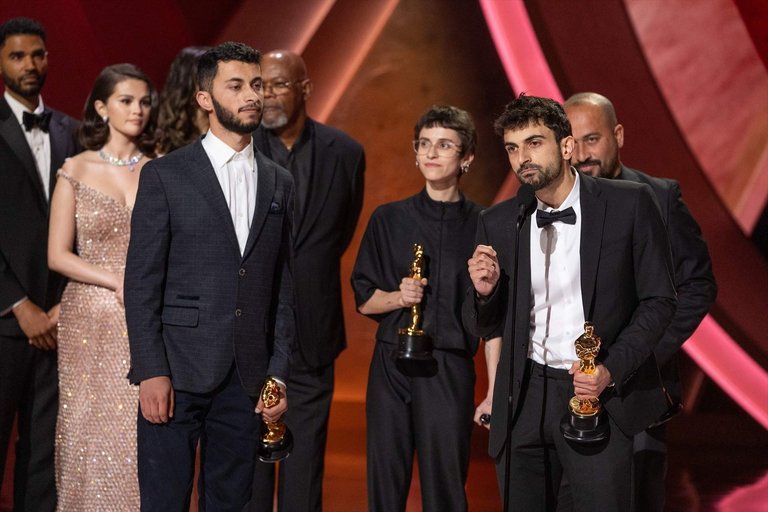
This alliance offers a glimmer of hope, a belief that dialogue and reconciliation are possible, but it also serves to show the contrasting realities of the two protagonists upon meeting: Basel lives under military occupation, without the right to move freely and persecuted by Israeli soldiers for filming them; and Yuval lives freely, able to come and go, at least at first, because later, due to his support for the Palestinians, he also becomes persona non grata to the authorities in his country. It's heartbreaking and frustrating to see how people can justify the unjustifiable.
Esa alianza permite tener un atisbo de esperanza, de creer que el diálogo y la reconciliación son posibles, pero además sirve para mostrar las realidades opuestas de ambos protagonistas al conocerse: Basel vive bajo ocupación militar, sin derecho a circular libremente y perseguido por los soldados israelíes por filmarlos; y Yuval vive libremente, puede ir y venir, al menos al principio, porque luego, debido al apoyo que muestra a los palestinos, también se convierte en persona non grata para las autoridades de su país. Es descorazonador y frustrante ver cómo puede existir gente capaz de justificar lo injustificable.
A Palestinian can no longer move freely in the territory that used to be his home. Cornered to a lesser extent, their cars cannot circulate on the Israeli side and the border is guarded by the Jewish army which separates the yellow (Jewish) license plates from the green (Palestinian) ones. In Masafer Yatta, all Palestinian cars were confiscated; its citizens are denied the right to possess an identity card, to continue living in their homes, they are denied building permits, and Palestinians who leave the villages and go to the city are forced to work as bricklayers, the only occupation in which they get jobs (paid less than their Jewish peers, of course) regardless of whether they have gone to college or are otherwise qualified. Don't these abuses and these laws remind you of another time and place? don't they resemble, perhaps too much, the anti-Semitic policies of the Nazi regime? what justification can the misnamed people of god have for acting in this way? how can there be so much rancor in the bosom of a people who, according to their god, believe in love? Politics and religion are intricate subjects in themselves, not to mention when they mix. No Other Land is a co-production between Palestine and Norway for which Yuval Abraham, Basel Adra, Hamdan Ballal and Rachel Szor have won several awards, including the Oscar for Best Documentary Feature. Yuval's acceptance speech at the ceremony, which called for peace, was called anti-Semitic in his native Israel.
Un palestino ya no puede circular libremente por el territorio que solía ser su hogar. Arrinconados a una extensión menor, sus automóviles no pueden circular del lado israelí y la frontera es vigilada por el ejército judío que separa las matrículas amarillas (judías) de las verdes (palestinas). En Masafer Yatta, todos los automóviles palestinos fueron confiscados; a sus ciudadanos se les niega el derecho a poseer un carnet de identidad, de seguir viviendo en su casa, se les niegan los permisos de construcción, y los palestinos que dejan las villas y se marchan a la ciudad se ven forzados a trabajar como albañiles, única ocupación en la que consiguen trabajo (cobrando menos que sus pares judíos, por supuesto) sin importar si han ido a la universidad o están capacitados para otras cosas. Estos abusos y estas leyes ¿no les recuerdan a otra época y lugar? ¿no se parecen, tal vez demasiado, a las políticas antisemitas del régimen nazi? ¿qué justificación puede tener el mal llamado pueblo de dios para actuar de esta manera? ¿cómo existe tanto rencor en el seno de un pueblo que, según su dios, cree en el amor? La política y la religión son de por sí temas intrincados, ni qué decir cuando se mezclan. No Other Land es una co producción entre Palestina y Noruega con la que Yuval Abraham, Basel Adra, Hamdan Ballal y Rachel Szor se han llevado varios premios, incluido el Oscar a Mejor Largometraje Documental. El discurso de aceptación de Yuval en la ceremonia, que hizo un llamado a la paz, fue calificado de antisemita en su Israel natal.
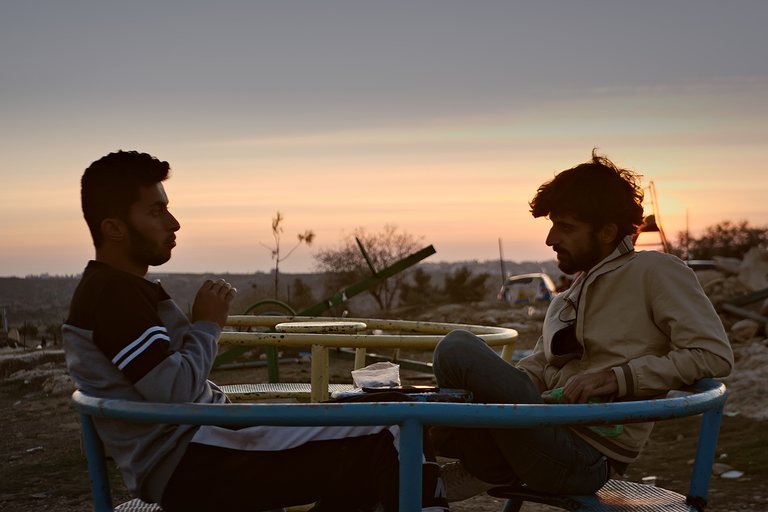
Since its conception, No Other Land has had to face censorship, media silence, Israeli-financed cultural institutions around the world refusing to screen the film, and not even having a distributor in the United States. The country that proclaims itself as the defender of freedom has echoed this silence. And yet, despite the threats, the reprisals (Hamdan Ballal was attacked in his home in Masafer Yatta) the filmmakers won the Oscar and their film has managed to get out into the world. It's true that even documentaries can contain elements of fiction, that not everything that is said can be believed at face value, that there's a version on each side of the story, and that in the case of the Israeli-Palestinian conflict, those versions are each more opposed than the other. But in this case, No Other Land has the collaboration of a Jewish journalist who doesn't agree with the official discourse of his government, how many other Jews will agree with Yuval? wouldn't that be a sign? are all Jews good and all Palestinians terrorists? Or the more difficult question, who is the rightful inhabitant of that land? aren't all those who were born there and have lived there indiscriminately from the name of their god? It 's true that No Other Land has helped to make visible the situation of Masafer Yatta, but today I am overcome by pessimism because it's just one more episode in an eternal conflict in which power has always triumphed and as we watch the movie and as you read this post, more houses are being demolished and more families are being expelled from their land. Today there is no final question, only sadness and a request: watch No Other Land.
Desde su concepción, No Other Land ha debido enfrentarse a la censura, al silencio de los medios, a que instituciones culturales financiadas por Israel en el mundo se nieguen a proyectar la película, a no tener ni siquiera distribuidor en los EEUU. El país autoproclamado como defensor de la libertad ha hecho eco de ese silencio. Y sin embargo, a pesar de las amenazas, las represalias (Hamdan Ballal fue atacado en su casa en Masafer Yatta) los creadores se llevaron el Oscar y su película ha logrado salir al mundo. Es cierto que incluso los documentales pueden contener elementos de ficción, que no se puede creer a pies juntillas todo lo que se dice, que existe una versión en cada lado de la historia y que en el caso del conflicto entre Israel y Palestina, esas versiones son a cada cual más opuesta. Pero en este caso, No Other Land cuenta con la colaboración de un periodista judío que no comulga con el discurso oficial de su gobierno, ¿cuántos otros judíos estarán de acuerdo con Yuval? ¿no sería eso una señal? ¿acaso todos los judíos son buenos y todos los palestinos terroristas? O la pregunta más difícil ¿quién es el legítimo habitante de esa tierra? ¿acaso no son todos los que allí nacieron y han vivido indistintamente del nombre de su dios? Es cierto que No Other Land ha ayudado a visibilizar la situación de Masafer Yatta, pero hoy me puede el pesimismo porque se trata de un episodio más en un conflicto eterno en el que el poder siempre ha triunfado y mientras vemos la película y mientras ustedes leen este post, más casas están siendo derribadas y más familias están siendo expulsadas de sus tierras. Hoy no hay pregunta final, sólo tristeza y una petición: vean No Other Land.
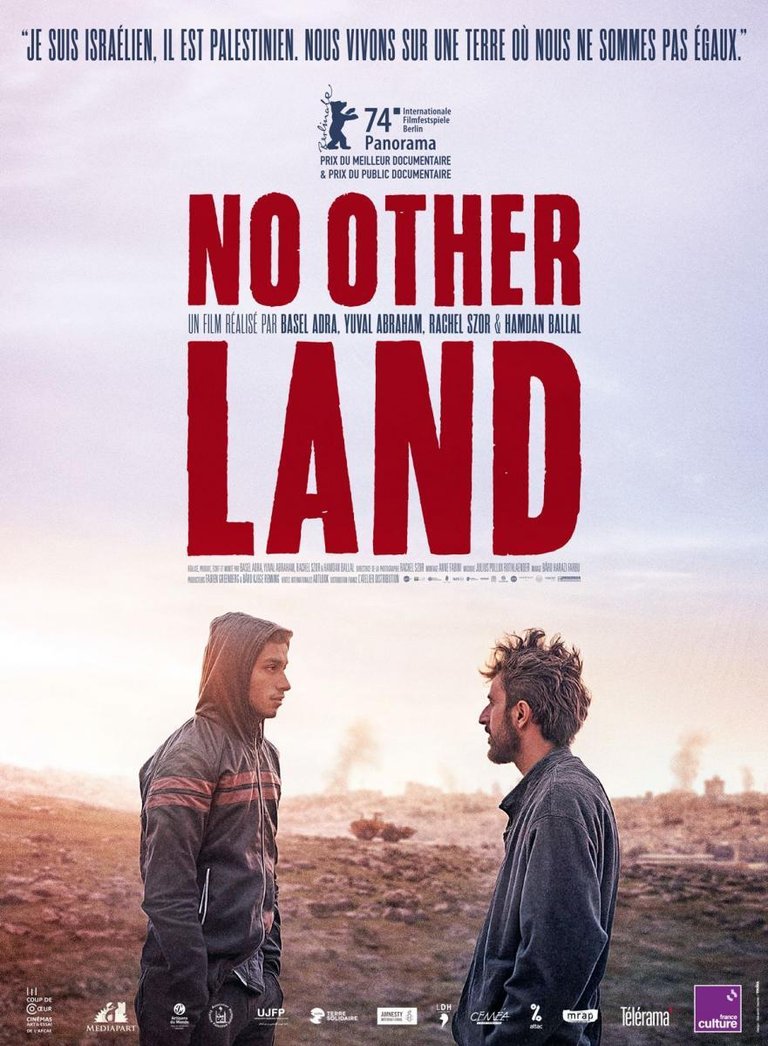

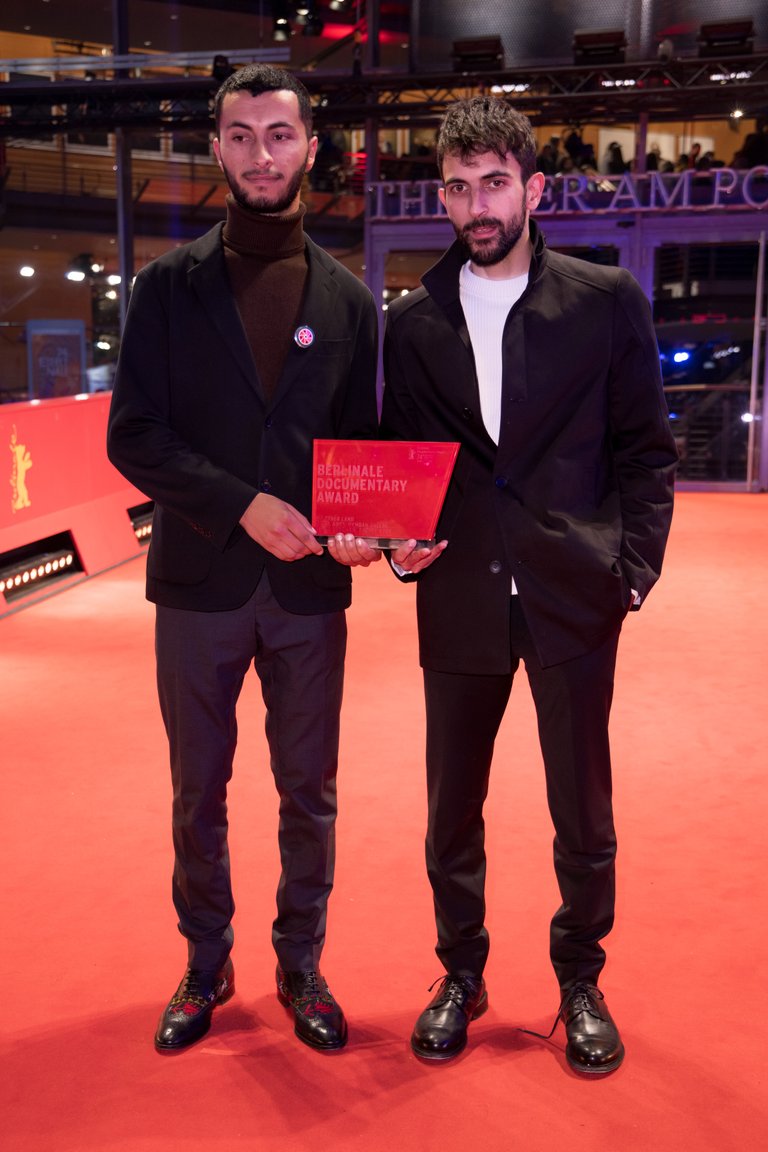
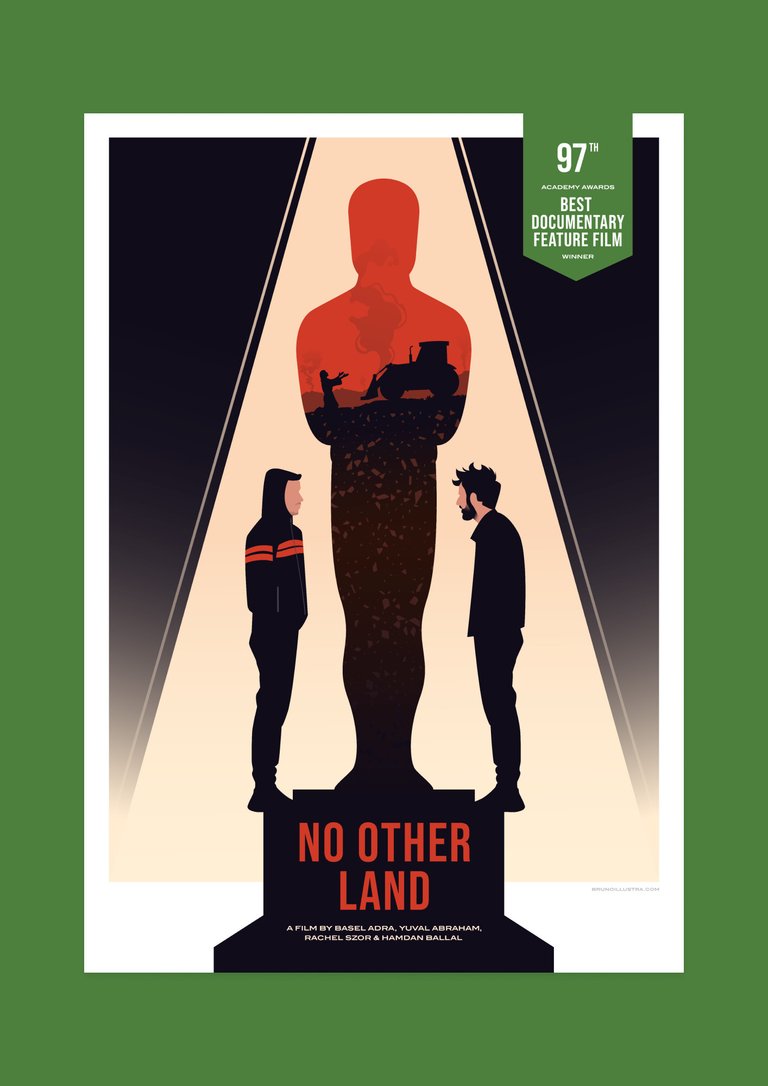
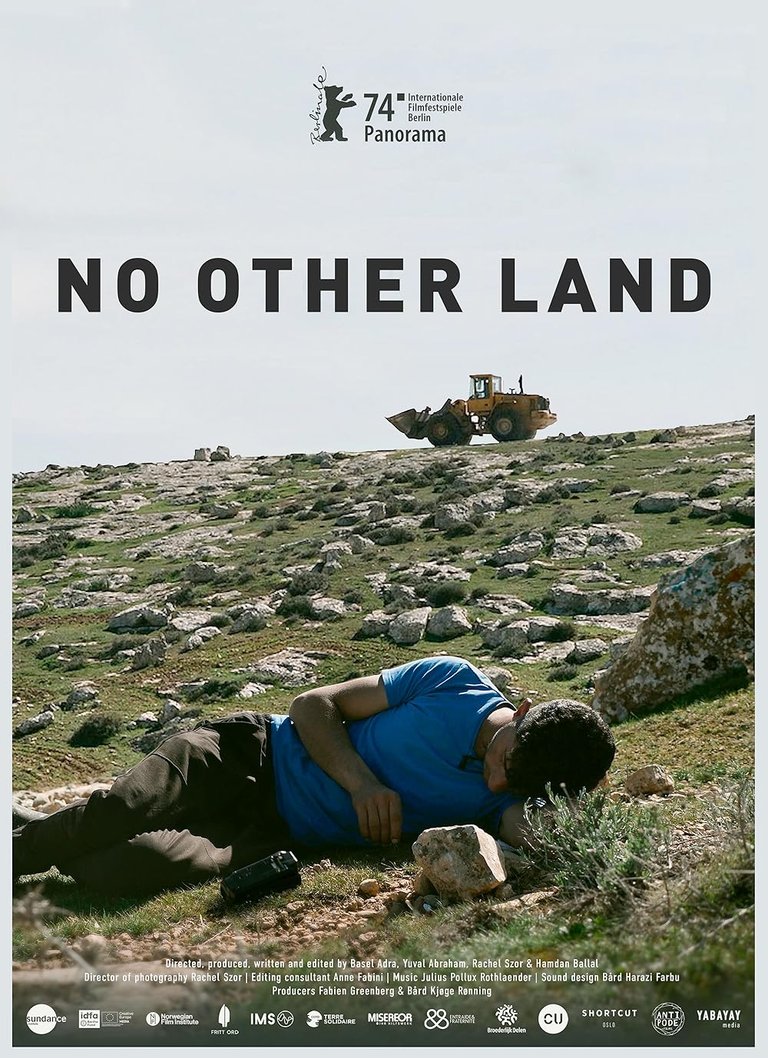
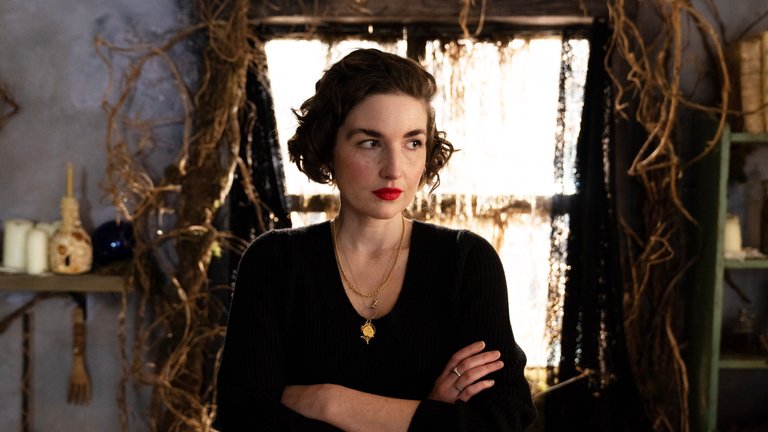.jpg)